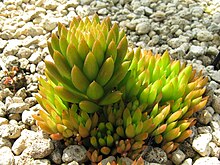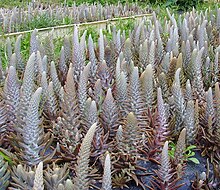| Orostachys japonica | |
|---|---|

| |
| Scientific classification | |
| Kingdom: | Plantae |
| Clade: | Tracheophytes |
| Clade: | Angiosperms |
| Clade: | Eudicots |
| Order: | Saxifragales |
| Family: | Crassulaceae |
| Genus: | Orostachys |
| Species: | O. japonica |
| Binomial name | |
| Orostachys japonica (Maxim.) A.Berger | |
| Synonyms | |
|
Cotyledon japonica Maxim. | |
Orostachys japonica (Japanese:爪蓮華、昭和、秀女)also known as rock pine is a species of flowering plant in the family Crassulaceae. Native to East Asia. Its main habitat is on the surface of mountain rocks in Korea, Japan and China.
Ecology
Orostachys japonica is a biennial/perennial plant growing to 10 centimetres (3.9 in). It is in flower from September to October. The flowers are hermaphrodite. The rosette leaves shape like a spatula.
- Suitable for: light sandy and loamy soils, prefers well-drained soil and can grow in nutritionally poor soil.
- Suitable pH: acid, neutral and basic alkaline soils.
Because of its growing shape which resembles a pine tree's cone, and its habit of growing on mountain rocks, it is also called rock pine. It grows well in a sunny or semi-shaded(light woodland) location with a well-drained and moist soil that is low in nutrients. Its flowers bloom from September to October. The flowers are white and each flower has 5 conical petals. The flower lacks a peduncle. Its calyx is divided into 5 parts. When the flowers bloom and produce seeds, it dries out.

Medicinal uses
The leaves and stems contain several medically active constituents including fatty acid esters, Friedelin and flavonoids. They are antispasmodic and cytotoxic. It has anti-cancer effects in vitro. In Korea, they are used in the treatment of cancer, gingivitis, coagulation and metritis.
References
- ^ "Orostachys japonica (Maxim.) A.Berger". Plants of the World Online. The Trustees of the Royal Botanic Gardens, Kew. n.d. Retrieved August 22, 2020.
- ^ Medicinal Plants In the Republic of Korea. Natural Products research institute (Seoul National University). p. 187.
- ^ "Flora of China on-line". FOC Vol.8 241000249. Flora of China on-line. Archived from the original on 15 October 2013. Retrieved 8 October 2013.
| Taxon identifiers | |
|---|---|
| Orostachys japonica |
|
| Cotyledon japonica | |
This Crassulaceae-related article is a stub. You can help Misplaced Pages by expanding it. |